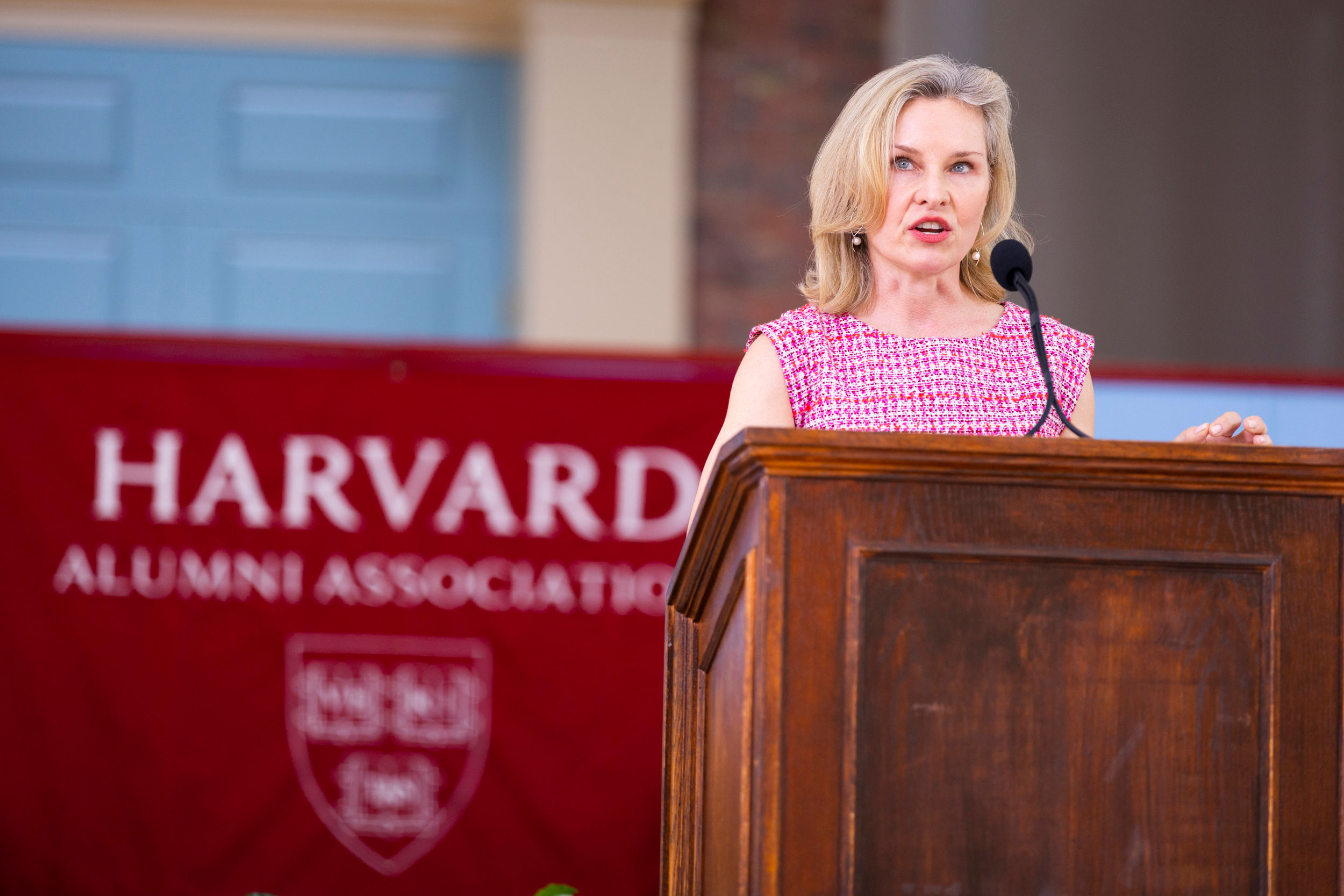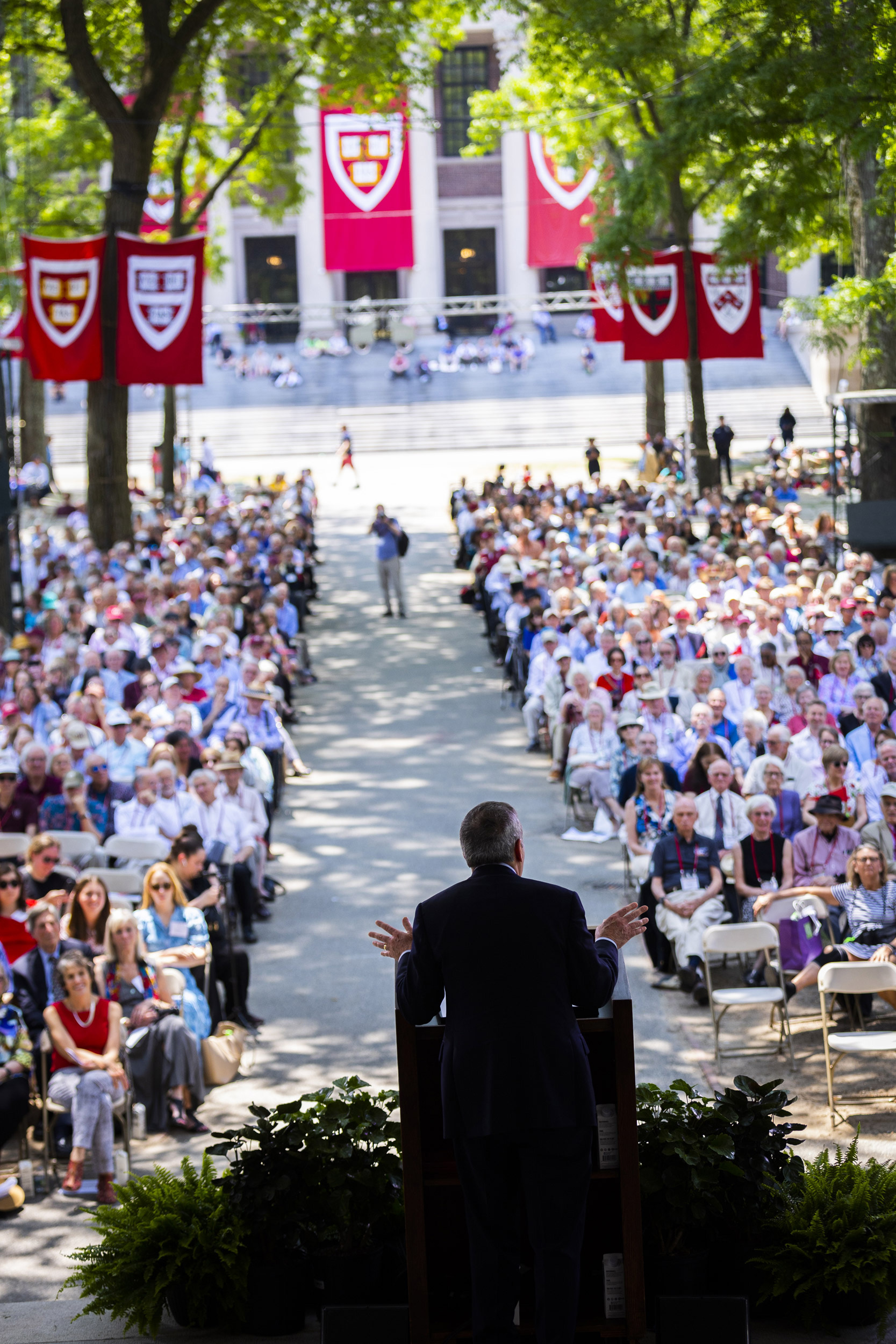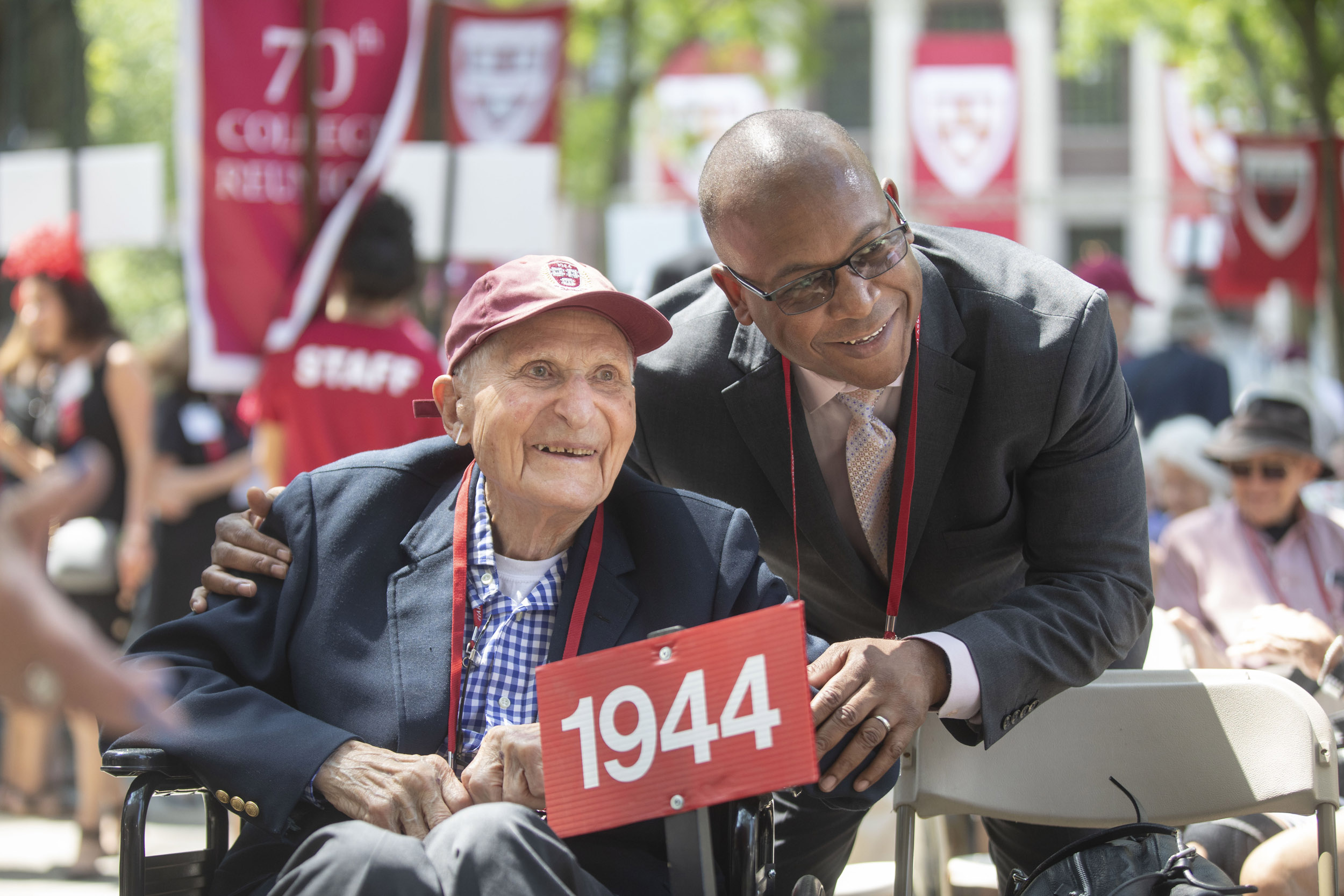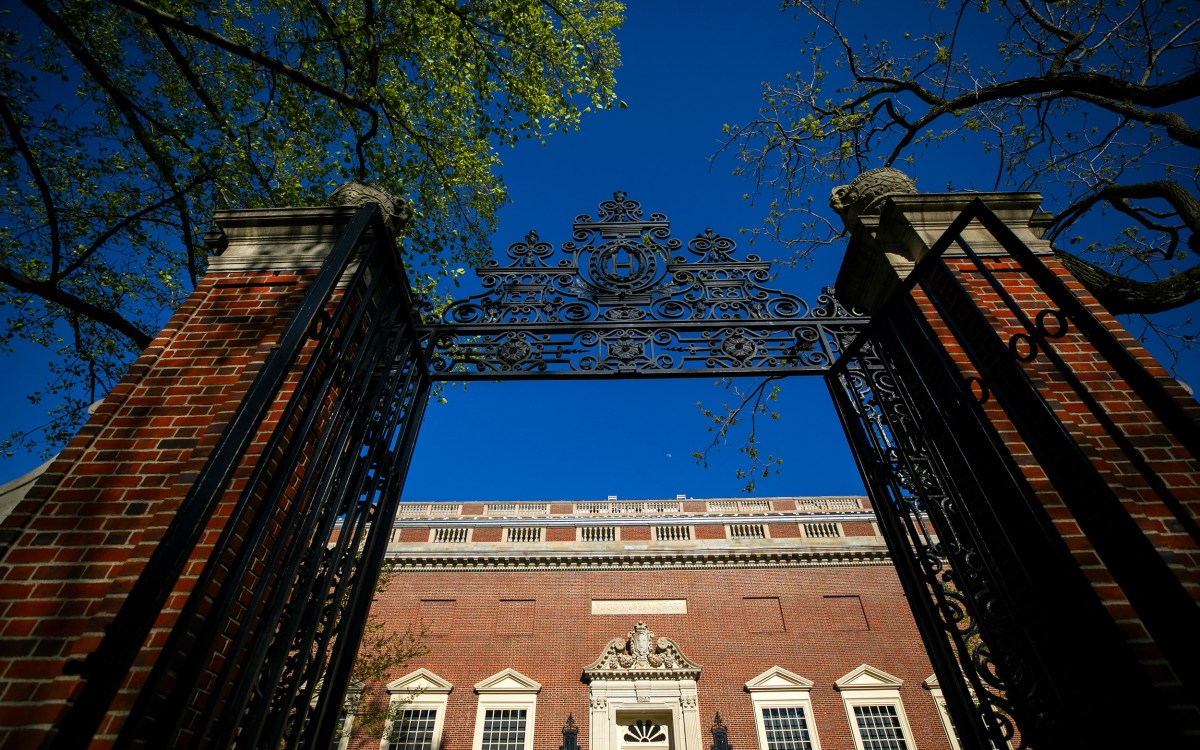
Mary Louise Kelly ’93, co-host of NPR’s “All Things Considered,” addressed alumni in Tercentenary Theatre.
Stephanie Mitchell/Harvard Staff Photographer
Honoring University grads – including one named Bacow
Second annual Harvard Alumni Day features keynote by NPR’s Mary Louise Kelly, parade, performances, awards, and a final farewell
It was apparent to Mary Louise Kelly that people on the street were afraid to talk to her for fear of reprisals from Iran’s clerical rulers.
The National Public Radio journalist had gone to Iran earlier this year to cover the aftermath of anti-government protests after the suspicious death in police custody of Mahsa Amini, an Iranian Kurdish woman who had been arrested for violating the country’s hijab rules.
Then one night amid the din of a government fireworks display marking the anniversary of the 1979 Islamic Revolution, she began to hear spontaneous chants for freedom echoing from the apartment buildings around her Tehran hotel.
“That moment revealed a very different narrative from what the government wanted us to see and hear,” said Kelly ’93 at Harvard Alumni Day during her keynote address Friday on the role of journalists amid global discord. “And we would have missed it, had we not gotten on a plane and witnessed it firsthand.”
The Harvard Alumni Association’s annual gathering, now in its second year, took place at Tercentenary Theatre and was livestreamed worldwide. Over 8,000 attended the event hosted by the association’s current president, Allyson Mendenhall ’90, M.L.A ’99, honoring alumni impact, citizenship, and community. The oldest alumni in attendance were 99-year-old Bertram A. “Bert” Huberman ’44, M.B.A. ’48, of Sarasota, Florida, and 95-year-old Ruth Samuels Villalovos ’49, of Cambridge.
Kelly, a co-host of NPR’s “All Things Considered,” cited former New York Times editor Dean Baquet in speaking about the need for reporting to be “restored to the center” of journalism. “It’s an important reminder in an era of fake news, alternative facts, and distrust of the media,” she said.
“My takeaway is that there remains a role, indeed a requirement in my profession, to show up and bear witness,” she said. “To bear witness, to record what we see and hear, accurately and honestly. To capture the world not as we wish it were, but as it is.”
The first Harvard Alumni Day took place last year and featured Tracy K. Smith ’94 as keynote speaker. A two-term U.S. poet laureate and Pulitzer Prize winner, Smith is professor of English and African and African American Studies in the Faculty of Arts and Sciences and the Susan S. and Kenneth L. Wallach Professor at Harvard Radcliffe Institute.


In his scheduled farewell remarks, President Larry Bacow expressed gratitude to the University, where he first arrived as a graduate student more than 50 years ago. At 99 years old, Bertram A. “Bert” Huberman ’44, M.B.A. ’48, was the oldest alumnus in attendance. Pictured with marshal Robert Louis.
Photos by Stephanie Mitchell and Kris Snibbe/Harvard Staff Photographers
This year’s event featured an all-alumni parade, musical performances, bagpipes, and a ceremony honoring the 2023 recipients of the Harvard Medal, recognizing extraordinary service to the University. A party in the Old Yard featuring food trucks, yard games, and a 360-degree photo booth followed the program.
The medalists included physician-scientist and educator Paula A. Johnson ’80, M.D. ’84, M.P.H. ’85; former executive director of the Harvard Alumni Association Philip W. Lovejoy; business leader Antonio Madero, M.B.A. ’61; and lawyer and federal judge Rya W. Zobel ’53, L.L.B. ’56.
Former senior fellow of the Harvard Corporation William F. “Bill” Lee ’72 awarded a surprise fifth medal to Larry Bacow, who will step down at the end of June after five years as Harvard’s president.
In his scheduled farewell remarks, Bacow expressed gratitude to the University, where he first arrived as a graduate student more than 50 years ago, receiving a J.D./M.P.P. in 1976 and Ph.D. in 1978. Before becoming Harvard president, Bacow led Tufts University for 10 years and served 24 years on the faculty of the Massachusetts Institute of Technology (MIT), where he was chancellor, chair of the faculty, and the Lee and Geraldine Martin Professor of Environmental Studies.
More like this
Bacow was noticeably moved by the end of the speech. He spoke about the role of serendipity in his career path, which led him to lead Harvard, something he had never expected.
“When I think of my own path, it was completely unpredictable,” said Bacow. “I came to Harvard as a graduate student with visions of being a lawyer. And I end up here, addressing all of you as president, for the very last time.”
“As I conclude my tenure, I continue to be amazed, amazed by this place, and its people, as I did when I walked onto this campus as a graduate student, almost 51 years ago.”
Bacow underscored the many ways in which the University and its more than 400,000 alumni have been able to make a positive difference around the world.
“Being president of Harvard is really a job like no other,” said Bacow. “Where else do you have the opportunity to work with scholars who are among the very best in the world? Where else can you watch young people come of age, knowing that they will excel in ways that they cannot imagine? And as the son of two refugees, I have pinched myself on many occasions, not believing that this is happening to me: walking down the Great Hall of the People in Beijing to meet President Xi Jinping, welcoming heads of state almost monthly, sometimes weekly, to Massachusetts Hall, watching our faculty come together to address and protect us from the ravages of COVID.
“I’ve also marveled at the creativity of our students, our faculty, and our alums, who inspire us through their art, their music, their literature, and their poetry. And how often in any job do you get to congratulate routinely Nobel laureates, Rhodes scholars, and people who are earning prizes within our community almost daily? And now this is when it’s good to be the president of Harvard: I actually got to throw up the first pitch at Fenway Park …
“While these fast past five years have candidly not been easy, they’ve also been richly rewarding. It’s really been a privilege of a lifetime to lead and to be part of an extraordinary community, a privilege for which I will always be grateful.”





